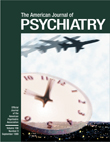Influence of a Functional Polymorphism Within the Promoter of the Serotonin Transporter Gene on the Effects of Total Sleep Deprivation in Bipolar Depression
Abstract
OBJECTIVE: A functional polymorphism in the transcriptional control region upstream of the coding sequence of the 5-hydroxytryptamine transporter (5-HTT) has been reported. This polymorphism has been shown to influence the antidepressant response to fluvoxamine and paroxetine. The authors tested the hypothesis that the allelic variation of the 5-HTT-linked polymorphic region (5-HTTLPR) could influence the response of depressed patients to total sleep deprivation. METHOD: Sixty-eight drug-free inpatients with bipolar depression underwent a night of total sleep deprivation. 5-HTTLPR was genotyped in these patients. Changes in perceived mood were rated on a visual analogue scale and analyzed by using repeated measures analysis of covariance. RESULTS: Patients who were homozygotic for the long variant of 5-HTTLPR showed a significantly better mood amelioration after total sleep deprivation than those who were heterozygotic and homozygotic for the short variant. CONCLUSIONS: The influence of 5-HTTLPR on response to total sleep deprivation is similar to its observed influence on response to serotonergic drug treatments. This finding supports the hypothesis of a major role for serotonin in the mechanism of action of total sleep deprivation in depression.



